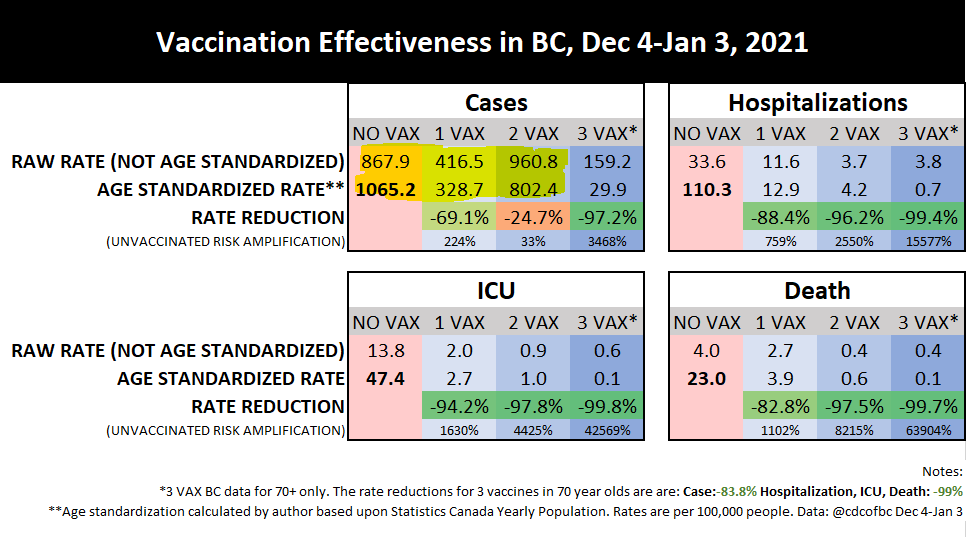
DATA SCIENCE:
COVID data by age.
This is very tricky, so please follow along.
I'll post the graph used as evidence of KID CRISIS first, then the exact same data presented as it's wielded as evidence of NO KID CRISIS.
Ontario COVID hospitalizations:
Kids are in crisis!
/1
COVID data by age.
This is very tricky, so please follow along.
I'll post the graph used as evidence of KID CRISIS first, then the exact same data presented as it's wielded as evidence of NO KID CRISIS.
Ontario COVID hospitalizations:
Kids are in crisis!
/1

Ontario COVID hospitalizations:
Kids are not in crisis! (Same data, same Y axis)
How do we reconcile this?
/2
Kids are not in crisis! (Same data, same Y axis)
How do we reconcile this?
/2

People who work in epidemiology/public health actually have to hold BOTH GRAPHS in their heads.
Children are not little adults and their health care needs are different. There is a reason that we don't compare children to adults often in epidemiology.
/3
Children are not little adults and their health care needs are different. There is a reason that we don't compare children to adults often in epidemiology.
/3
The scarier graph, in which each age group is standardized where the maximum is at the top but the y-axis is variable, is important to understand relative trends within the age band.
Here, it's clear hospitalizations are spiking in young people & lower than pvs in older.
/4
Here, it's clear hospitalizations are spiking in young people & lower than pvs in older.
/4

The graph that feels much more reassuring for kids is important to understand the total health implications across all age bands, and by keeping the y-axis constant, one can understand in terms of absolute risk, where things are.
Far more adults hospitalized than kids.
/5
Far more adults hospitalized than kids.
/5

Both absolute and relative risk are very important. If you are 30 & smoke, your relative risk of lung cancer is very high (15-30X). Your absolute risk is very low. This means that most smokers at age 30 won't get lung cancer, yet 93% of lung cancers at age 30 are smokers.
/6
/6
With respect to pediatric things, it's important to note that most kids don't get sick and go to hospital and kids very rarely die.
For example, per @CDCgov in 2019, this is the death rate in all age groups
/7
For example, per @CDCgov in 2019, this is the death rate in all age groups
/7

Looking at that chart, if all you did was look at the absolute risk of death, and made decisions based on this, you would likely severely minimize the importance of childhood deaths.
/8
/8
But if we zoom in on one age bracket, for example 10 to 19, it refills very important data, especially when we look at 2020. See how there is clearly excess death, which would have been completely hidden on the scale of 70-year-olds.
/9
/9

It's important remember that graphs are just visual representations of data. Like all data, choice of presentation matters. When you see data being presented, look at the y-axis, x-axis, & try to determine whether or not you are looking at Raw numbers or rate per population.
/10
/10
Epidemiologists who work with Healthcare data know how to interpret these graphs.
I commonly see anti-vax types use absolute risk graphs to minimize the impact of COVID in kids, and fear-promotion can occur with solo relative risk to maximize it.
Both graphs are important.
/11
I commonly see anti-vax types use absolute risk graphs to minimize the impact of COVID in kids, and fear-promotion can occur with solo relative risk to maximize it.
Both graphs are important.
/11
I personally believe that age stratification matters and we should be comparing like to like.
For example, one in 40,000 children will die of cancer.
1 in 77 at 85+ die of cancer.
Using this knowledge to minimize the importance of pediatric cancer is asinine.
/12
For example, one in 40,000 children will die of cancer.
1 in 77 at 85+ die of cancer.
Using this knowledge to minimize the importance of pediatric cancer is asinine.
/12
When it comes to pediatric hospitalization data, it's important to remember that hospitals are designed to run at high capacity. A spike in cases in a children's hospital, even if it's relatively small compared to adult hospitalizations, can have huge impacts on Healthcare.
/13
/13
One of the whole reasons I became a pediatric psychiatrist is because I love working in a field in which I rarely encountered death. However, when death occurs, we are NEVER REASSURED by how rarely children die.
Everyone dies, but children are not supposed to die.
/14
Everyone dies, but children are not supposed to die.
/14
(ironically, I then became a suicidologist often facing death).
/Fin
/Fin
• • •
Missing some Tweet in this thread? You can try to
force a refresh







